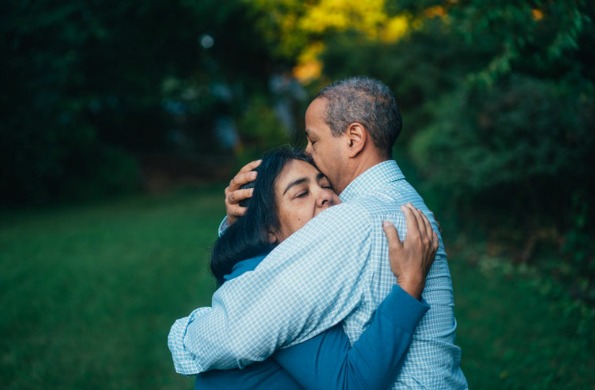You’re flaky. You just want attention. It’s all in your head. You just need to tough it out.
I’ve heard every single one of these things…. But I think if anyone could see the countless hours I’ve spent crying, praying, and lying in bed because even walking around is too painful — well, I think they’d change their tune.
It’s a grim picture, but for people with a chronic illness, it’s more than a picture — it’s life.
 I don’t think anyone would argue that being sick is horrible. It’s exhausting, discouraging, and sometimes makes you wonder if you’ll ever feel normal again.
I don’t think anyone would argue that being sick is horrible. It’s exhausting, discouraging, and sometimes makes you wonder if you’ll ever feel normal again.
Imagine feeling that way 24/7.
Chronic illness is debilitating in so many ways, but sometimes even worse than the physical pain is the emotional pain. Having someone tell you that you’re flaky or that you’re weak when you’re in tremendous pain is like having someone kick you over and over when you’re trying to get up.
On the other hand, having someone encourage you and show compassion when you’re struggling makes all the difference in the world.
When my husband and I first got married, he experienced my chronic illness in a way he never had before. As I would lie in bed at night crying and shaking in pain, he would hold my hand and tell me he felt so helpless. I thought about that a lot — I knew having an illness was hard for me, but I didn’t realize how hard it could be for the people around me who wanted to help.
The painful truth is that when someone you love and care about has a chronic illness, you can’t take the pain away. But there are so many other really simple things that you can do to help.
So that’s why I wrote this article: to help those who are suffering to feel understood and to help those standing on the sidelines know how to understand.
Never, Ever, EVER Call Your Friend Flaky
I seriously can’t emphasize this enough. Being sick and having frequent flare ups means that your friend is occasionally going to have to cancel plans at the drop of a hat… And doing that isn’t easy. Honestly, it’s humiliating. I can’t tell you how many invitations I’ve had to cancel at the last minute — and every single time, without fail, I worry that the other person is going to think I’m making up being sick.
So how do you handle it when your friend cancels plans? Again?
Let me tell you a story that happened to me just a few weeks ago that healed my heart and helped me to feel loved and understood.
 During the Sunday school hour of my church, my husband and I are sometimes assigned to teach. A few weeks ago, when it was our turn, I had gotten up and gotten ready; then, right before we left, a horrendous stomach ache attacked. I texted the person who is in charge of making assignments to let him know we weren’t going to make it to church. (A lot of times when I’m really sick, my husband stays home to take care of me and comfort me because I get really scared being in so much pain. I’ll get more into that later.)
During the Sunday school hour of my church, my husband and I are sometimes assigned to teach. A few weeks ago, when it was our turn, I had gotten up and gotten ready; then, right before we left, a horrendous stomach ache attacked. I texted the person who is in charge of making assignments to let him know we weren’t going to make it to church. (A lot of times when I’m really sick, my husband stays home to take care of me and comfort me because I get really scared being in so much pain. I’ll get more into that later.)
I wrote, “Hey Mark. This is Amy Keim from church. We were all ready to go but my stomach started hurting really bad (I have chronic stomach problems which is why we miss church too often 😭). Could you guys possibly combine with the other class? Or I can send you all the videos we were going to use.”
I felt HORRIBLE, and not just physically. I felt like I was messing everything up and that, as always, I was letting people down. I worried that he would think I was making it up because I didn’t want to teach. I felt sick, embarrassed, and vulnerable.
His response, though, made all the difference in the world.
He wrote back a few hours later, “Sorry! I just got this. I’m so sorry, Amy. We took care of the lesson and everything worked out great. No worries and hope you feel better soon. You never need to feel bad for missing for that reason, I hope you guys know. I have a brother who had ulcerative colitis and it was so sad and difficult.”
His text made me cry, but happy tears this time. I had been so worried that he would think I was a wuss and that I was a huge flake, but his kind response made me feel like someone not only trusted me, but cared about me — and he hardly even knew me! When I was feeling incredibly discouraged and down, his response lifted me up and made me feel worthwhile.
So when your friend cancels at the last minute, please resist the impulse to get mad. Not responding or responding with something negative is going to make your friend, who already feels terrible, feel even worse.
Instead, tell them you understand — or if you don’t understand, that you wish you did. Tell them that you’re sorry; that you know it must be hard to be so sick. Be genuine, compassionate, and kind.
Don’t Diagnose
This one is tricky! Often when you try to diagnose your friend, you’re doing it out of love because you care about them and want to get to the bottom of whatever is making them so sick all the time.
 So let me let you in on a secret: it’s all in the approach.
So let me let you in on a secret: it’s all in the approach.
When you want to suggest to your friend that they should try something, here’s a do-and-don’t example of what to do.
Don’t: “You need to stop eating ___. You need to get off of this medication. You need to see this doctor. You shouldn’t be doing ____.”
Basically, just don’t assume that you know exactly what they need to do. Cut out the “you need to”s and the “you shouldn’t be”s.
Do: “Have you ever thought about cutting out these foods? I’ve heard that some people have success with this remedy; maybe you could try it? I have a friend who visited this doctor, and they really helped her — can I give you their number? I wonder if doing ___ is making things worse?”
Even when someone is making obvious suggestions (for instance, people ask me all the time if I’ve tried cutting out gluten or dairy – I have), if they do it out of love and approach it kindly, I’m touched that they were thinking of me. But if someone tells me when I need to be doing, assuming they know my body better than I (or my doctors) do, it makes me feel frustrated, hurt, and misunderstood.
Understand That Breakdowns, Anxiety, and Depression are All Normal and Expected
 That one’s pretty self-explanatory, but I’ll expound just a little. When you are sick all the time, you’re going to have breakdowns — probably regularly if you’re anything like me. Every few weeks after a bad stomach ache, I get SUPER discouraged. I cry — like, a lot. I tell my husband, “What kind of life is this? I can’t do anything. Why can’t I be normal?” and so on and so forth.
That one’s pretty self-explanatory, but I’ll expound just a little. When you are sick all the time, you’re going to have breakdowns — probably regularly if you’re anything like me. Every few weeks after a bad stomach ache, I get SUPER discouraged. I cry — like, a lot. I tell my husband, “What kind of life is this? I can’t do anything. Why can’t I be normal?” and so on and so forth.
There’s not really much you can do when your friend or loved one is having a break down like this other than listen. Just listen and love them. Andddd
Ask What They Need
I’m not talking about asking if you can go to the store to get them anything, although that is super nice and thoughtful. Typically, your friend has all the equipment and tools they need because they’re unfortunately used to being sick.
Instead, ask what comforts them: having someone with them? Telling them they’ll be okay? Being hugged or having their hand held?
I’ll give you a quick example. When I’m sick, for whatever reason, the only person I really want around is my husband. It’s not that I don’t love my friends, but my friends can’t follow me into the bathroom and stroke my hair when I’m violently ill. (I mean, I guess they could, but…. I think it would be uncomfortable for all parties involved. Hah.)
My husband, who, as I mentioned before, told me he felt helpless, is actually the biggest comfort to me. I thought for a while about what he could do so that he doesn’t feel helpless when I’m sick, and I realized there was something vital he could do: he could tell me that I’m going to be okay.
I don’t know if everyone is like this, but when I get really, really sick, I get really, really scared. Sometimes I’m almost positive I’m going to die. So I told my husband, “When I tell you I’m scared, I need you to tell me I’m going to be okay. If you get scared too (or tell me you’re really scared, at least), I get even more scared. So just tell me I’m going to be okay.”
And he does. When I say, “I’m scared. I’m scared I’m going to die,” he responds, “You’re going to be okay. You’re not going to die. You’ve been through this before and you’ve gotten through it. I’m sorry that you’re scared; I know it hurts really bad. But you’re going to be okay.”
That may not work for everyone, but it works for me. So ask your loved one what they need when they’re sick! Simply trying to understand your friend will mean everything to them.

To read more of Amy’s articles, click here.
So basically it comes down to this: don’t judge. Be kind. Treat your friend how you would want to be treated if you were sick.
It will mean so much more than you know.
p.s. Comment what helps you when you’re sick or what thing you wish people knew about your chronic illness! I’d love to make more lists in the future, even if they’re just short snippets, about what to do when you (or a loved one) has a chronic illness, so your suggestions will really help me out!
Amy Carpenter is the site manager and editor for LDSBlogs.com. She served a full-time mission for The Church of Jesus Christ of Latter-day Saints in Denver, Colorado, where she learned to love mountains and despise snow. She has a passion for peanut butter, dancing badly, and most of all, the gospel.







Amy, this is a great article! I super appreciated it!! Since getting married I’ve had some crazy health stuff. It started a couple weeks after marriage, but basically I was passing out around four times a day for no apparent reason! It took 22 months of every-type of Doctor and a million medical bills to find out the closest “box” I’ll ever fit in. We learned that it will be there forever and that my goal should be to just keep it under control and manage it. My thoughts and pleas to the public in addition to what was stated in your article would be:
1. Trusting that the “amazing and healthy looking person you saw could actually be experiencing what they say they did.” I have gotten so many times, “but I’ve never see you have that before.” “But you never had that in your mission or in high school.” Even from my own parents!!! I just wanted people to know that when I take the time to open up to them about a struggle in life, it makes me feel like an idiot that they don’t believe me. I sit and think, “that’s ridiculous! Only the closest people to me actually see it sometimes and it’s actually really scary!” When they don’t believe me it makes me feel like I’m making it up, when I’m not. The truth is it’s actually that bad, and I just wanted to talk to someone about it…. but now I’m totally regretting telling anyone, so I’ll just go back to lifting this burden myself.
The other thing I would point out is actually some thoughts and understanding that should be given to the spouse.
People need to know what a trial it can be for the spouse. My husband has told me that it’s mentally hard for him at times knowing it can attack at any moment, any place, no matter how important. He feels a lot of weight of the illness because when I pass out he is the “fixer”, he gets to carry me out (literally) of every bad situation and figure out how to get me to a safe place.
Second I feel that we should give the spouse some slack. (Boss’s, co-workers) or whomever else was counting on them that day). These people need to realize that somehow in the deck of life, my spouse was dealt to be a caretaker. And caretakers shouldn’t be judged for having to stop everything to take care of what is most important. (My husband gets a call from people all the time saying I’ve psssed out, it’s his job then to leave what he’s doing and come get me.) he helps me when I can’t help myself. That should be looked at as an amazing quality and not judged.
I just wish people had more empathy for the caretakers because they never know when they will be needed and they are the best of souls.
Leah, I LOVE this! I think I could write a whole ‘nother article just based on what you’ve said. So many wonderful points, and articulated so beautifully. It’s so true — spouses end up dealing with the brunt of our issues so often, but people don’t always recognize that and realize what a huge responsibility it is. My husband has been my lifesaver in every way, and I know yours has as well. And I LOVED what you said about people not believing you, making you wish you’d never said anything at all. I’ve experienced this so many times! Just because someone can’t see something or it doesn’t make sense to them, that doesn’t mean it’s not real. It is, it’s not just in our heads, and it is scary and painful. I’m so sorry you’ve had to deal with these horrible health problems! You are a beautiful person, inside and out, and I’m so lucky to know you! I hope things get better for you, health-wise, and that you can receive the medical attention and help you deserve. Love you!
Thank you so much fir this article I is a great comfort. I have Lymes Disease but also an allergy ti Sulfa found in Our tissues. it us also found in beef turkey beans brussal sprouts, Milk, Quinoa!It made my life very bad month if May 2022 I have other tins if food allergies.